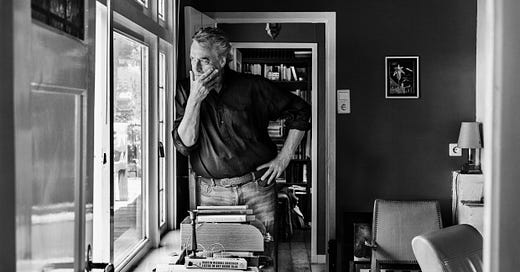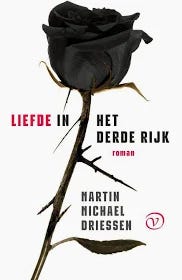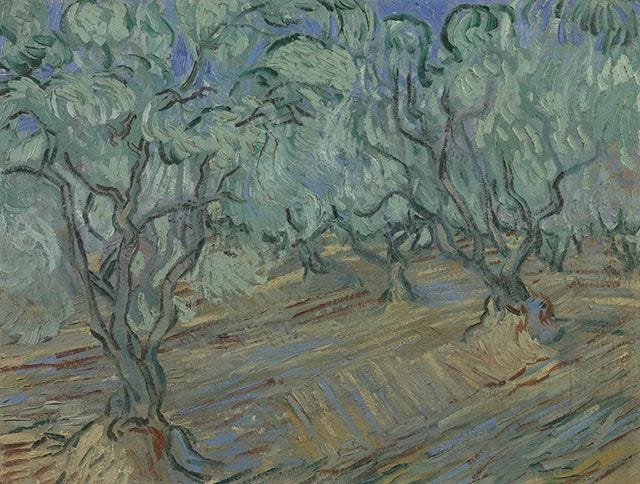Martin Michael Driessen by Jildiz Kaptein in Trouw 19 June 2025
We had not reached the end of our street yet, when the Dutch radio channel NPR 1 started a live interview with the author of the new novel “Love in the third reich”, by Martin Michael Driessen. Dad kept talking over it, brimming with all the car details after days of browsing for suitable second hand vehicles. I tried listening to both at the same time. Not my forte.
Context is not justification. Compassion is not the same as acceptance, condoning.
The worst, according to the author is, is when love and ideals are abused, when people who are not 100% evil are lured into false beliefs. I have not read the book yet, but I have just ordered it. This is one where I am not willing to wait for months until it pops up in my book app library:
“Georg, Lore, and Klara. Three stories that coil like serpents through the twentieth century, each with its own timeline, sometimes intertwined, sometimes apart. All three are Nazis, each in their own way, one more hardened than the other. Klara plays a key role in the Lebensborn programme, Lore is her driver, and Georg is an ordinary soldier.
All three are moved by the Fates. Through them and with them we experience the passion of first love and the misled idealism of a youth shaped by a totalitarian regime. Tossed between innocence and the instinct to survive, loyalty and betrayal, they live through the horrors of the Second World War.
In Love in the Third Reich, Driessen tells this war story from a wholly original and unexpected angle. With compelling, vivid storytelling, he brings us alarmingly close almost inside the experience. The result is a deeply unsettling fascination that stays with the reader long after the final page.”
One of the characters in the book, Klara, is based on the author’s aunt. He even left her name in tact. He did not write the book to make excuses, he did so because he needed to understand. How was it possible for an uncle to hold onto his Nazistic beliefs, even after the war? Even until the end of his life. What had gotten into these people, his relatives, his kin…
I have very different kin. I can look back, up the family tree, shake it hard and no rotten war fruit will fall out. I have learned this does not mean we are blameless, any less complicit. Being born white and Western means being born under bias. Being dropped into a context that conditions in very specific ways too. Ways that need constant challenging and questioning.
Reading the brief description of the book, which I shared above in translation (the book just came out and is not available in English yet) my brain makes an uncomfortable and unexpected connection. I read the word “lebensborn” and my brain goes.. remember reading about the upsurge in birth right travel to Israel. People have been calling the destruction of Gaza a “new Holocaust”. It makes my blood run cold.
I have a lot of work to do, before I fully understand my own identity, both in terms of how I see it, how it was created, how it is perceived by others, and all the possible judgments, conclusions and separations that come with this.
Genocide has a terrifying relationship with identity. And it has turned all debate into a brutal minefield.
I am Dutch. The word “apartheid” comes from the Dutch language. That say a lot about my national legacy, doesn’t it? I belong to the Eurocentric gravitational point of this world. I have been conditioned with bias, of course. Bias that asks me to believe some people are mine and others aren’t.
HOW I SEE
I had planned a series of posts (it may still happen) in an organised stream of consciousness flow of thoughts, observations and questions, tracking the last year or so, looking back on my entire life. My awareness of 1995 and the Palestinian hunger strike. Being called a “terrorist whore” for wearing a keffiyeh, the Palestinian scarf. Before that, the two teenagers who visited our high school as part of a joint peace programme. A Palestinian boy, whose name I wish I still remembered. A Jewish girl, named Yonit Levi, who I sent a few postcards to in the years following her visit. Adding a minor in Islam to my cultural studies degree, attending the debates during IDFA 2003 (here a Haaretz journalist saw it appropriate to cite this by director Ra’anan Alexandrowicz: “IDFA al Yahud a play on Itbah al Yahud, which is Arabic for Slaughter the Jew” - which shocked me as I had seen all film makers side by side there, talking with each other).
How do I feel about Gaza? What do I even know? I had bundled as many of my notes as I could, and then looked for coherence, structure. I got hopelessly lost. Because I can’t keep up. The daily death count, the torn limbs, the starvation, the last hospital treating cancer patients having to shut down.
Israel attacks Iran, Iran hits back. More discussions, more tensions more strangeness. The Dutch newspaper reports how Israelis are suffering from “war fatigue”. People are quoted as saying.. we were on holiday in Italy, if we had waited one day, we would not have returned her at all now.
It triggers a rather unpolished response on my part: You are kind of wearing me out to the point of compassion fatigue.
I am not tired because I am seeing too much suffering (even though this is beyond anything I have ever experienced in my life). I am exhausted because there is this constant pull, and push, to align with a hierarchy of pain. To proclaim one is more deserving of my compassion than another.
I know it is not fair, fear of death is fear of death, and I realise, if I am not careful I am stepping into the hierarchy of pain too.
And I refuse. I will not go there. I will not hate, I will not celebrate suffering and death. Even though I see many do, cheering bombs and bullets from all directions. I can’t go there.
If my stance for a Free Palestine is seen as rendering the Jewish State of Israel as impossible or illegal, so be it. I personally do not believe it had to be either or, but if that is where we are now, I accept it. I believe in the right of sovereignty and safety of the Palestinian people. I believe in the sovereignty and safety for the global Jewish population. I do not believe one has the right to annihilate the other.
If it comes down to a choice between one or the other, I choose Palestina, now int his instance, I feel the urgency of having to make this stop. Francesca Albanese (UN) has much more sophisticated way of addressing and embedding this in the context of international law, but I do my best.
DENIAL OR DELUSION?
I am curious to read the Love in the Third Reich and what it will offer me in my reflections on the current state of global affairs. I want to keep my humanity in tact.
I have to tread carefully here. The core of conversations here in my personal life have centred on these things:
Who can we trust when information comes through manipulated media sources?
What does democracy mean when Western governments stall, stay idle or side with Israel when “we” do not want this?
What is true in historical context and what rights and responsabilities can be deducted and distributed from this?
What can we do to stop this?
I am also curious to see, curious being a godawful word in this context, what comes after. What happens after the genocide in Gaza is finally brought to a halt. What reckoning will there be? Comparing it to WW2 will there be war crime tribunals? There is already a list of endightments and warrants, including attempt to hold media corporations like the BBC accountable as complicit to genocide (the only precedent I have found of this was the conviction of a Rwandese radio station that actively incited genocide).
Who will bring everything that will be needed to rebuild Gaza. How can Palestinians be protected in the future. How will pro-Israel supporters be perceived?
Caitlin Johnstone does not pussyfoot around when it comes to some of these questions:
“Do Israel’s supporters know it’s over for them? Like, they know they’re going to be despised for the rest of their lives, right? That they will never, ever live down the fact that they supported a live-streamed genocide? And that it will only get worse for them as history clarifies things?
Surely they must realize this by now. Surely they must realize that nothing they do for the rest of their lives will ever be as significant as the fact that they played cheerleader for genocide and all of Israel’s demented warmongering, long after normal people realized it was the wrong thing to do. That in the eyes of the world they will all always be first and foremost someone who supported and defended history’s first live-streamed genocide.
I wonder what that’s like, knowing that about yourself? If that was me maybe I’d be pushing for World War Three as well, I dunno. Maybe I’d hope we could turn the whole world into Gaza and let the flames wash away human memory of the things we had done. That enough death and destruction spread out across enough of the earth would make my crimes look small in comparison or something.
It won’t work, though. Everyone’s always going to remember what they did. Their grandchildren will be disgusted by them. Their families will carry their shame for generations.
What a terrible way to be.”
Not exactly the same approach Driessen used for his novel, for his compassionate inquiry into the more “rotten parts” of his family tree. I understand where Johnstone comes from, but I can’t align with it.
Driessen questions, he does not condone. In one of the most mundane moments that illustrates the insanity of modern life, I talk about this with my neighbour while she is out on her drive way cleaning out her compost wheely bin.
How is it even possible. How can people keep defending what happens in Gaza? Earlier in the week a member of GroenLink/PvdA said it is time our country stops supplying military parts to Israel, defence or otherwise. Other parties started yelling in a way that to me is so delusional and undignified: How dare you even suggest we leave Israel “defenceless”. Shouldn’t we at least talk about that?
I can’t swallow that. I really can’t. Because if I do, I won’t just throw up, I will throw away my humanity. Universally nobody should be left defenceless (Srebrenica, if anyone cares to remember), contextually the military balance between Israel - Gaza (and region) is so out of whack, the argument doesn’t hold. Nothing, except a full weapons embargo makes sense now.
I do not endorse a potential weakening of a defence system so more people can get killed, more easily. In a warped way I would like to think that if the Iron Dome starts to crack a little, then maybe the ones in charge will reconsider how far they are willing to take this. That is how desperate this has started to feel. If the strength of the defence is not put in place to protect the sanctity of life within, but is used to come down harder on those without, then I need to leave that door open.
Whatever the context or the history, no life should be taken through violence. I do not have the right to kill anyone. I do not condone the justifications, no matter who is killing who. I cannot contextualise anything as a justified retaliation for past hurts, I can’t view pre-emotive strikes as self-defence. It is just now how I am wired, when the world is…
How long before the Dutch holocaust guilt runs out? (and with 75% percent of Jewish people surrendered to the Nazi occupiers never coming home, that is not a small one). How long before we acknowledge that people are capable of defending anything, even unto death, because acknowledging what you did turns all your past suffering, all your pain, all your purpose, meaningless. We are seeing, over and over again, that people would rather kill or die for what they believe in. Even if what they belief looks utterly delusional to someone else.
I fully acknowledge the limits of my own perspective, so I can’t rule out I turn out to be delusional too…
Olive trees by Vincent Van Gogh
THROUGH THE TREES
In a way it is ironic. I have always preferred to hold space for someone else to tell their story. I put self representation above fighting someone else’s battle for them, whether it was my fellow female students studying Islam at the university of Amsterdam, the Romany kids I worked with in Romania, the Palestinian people. But is is impossible to say nothing.
I have no intention to police discourse, reframe someone else’s narrative on their behalf (I am working on a piece about language and who is supposed to translate for whom, especially when it comes to weaponized terms as “martyr” or “settler”). All I do wish to do is bear witness, to not look away, to not abandon, not deny, not endorse. I wish to be here, with you.
Before getting into the car that morning to go check out a car, and listening to the radio interview with Driessen, I had just had a bit of a mystical experience involving a black walnut tree. Walking home, holding a little seedling, something dropped into my head.
“I wish the land could speak.
Of the people whose blood seeped into it.
Of the roots of the trees that once were there.
Or the water. That it could tell us about small feet and hands wading in it.
I wish other than human could tell the tales so it is finally believed.”
When I shared it with another Substack writer, because she had just posted a note with a picture of trees and a line that said; One day the earth will testify, she told me inspiration had come from a Qur’an verse:
“When the earth is shaken with its [final] earthquake
and the earth discharges its burdens,
and man says, ‘What is [wrong] with it?’
That Day, it will report its news,
because your Lord has commanded it.”
— Surah Az-Zalzalah (99:1–5)
She then told me how among the American native peoples a similar belief lives, that earth and nature will testify. I thought of the Cherokee people, their mass displacement, their Trail of Tears. And their reverence for the Black Walnut Tree…
What if the earth, nature, and the animals are already testifying, but we have forgotten to listen?
WHERE TO GO FROM HERE
I posted a note earlier this week:
As a journalism student I was taught to be “objective”. As I cultural studies student I learned no such thing exists.
It links to another one where I questioned the frameworks of modern journalism and online marketing: I don’t believe it, I no longer buy it.
I want to stay in the loop, and at the same time I want to opt out. And just get lost in the woods instead…








